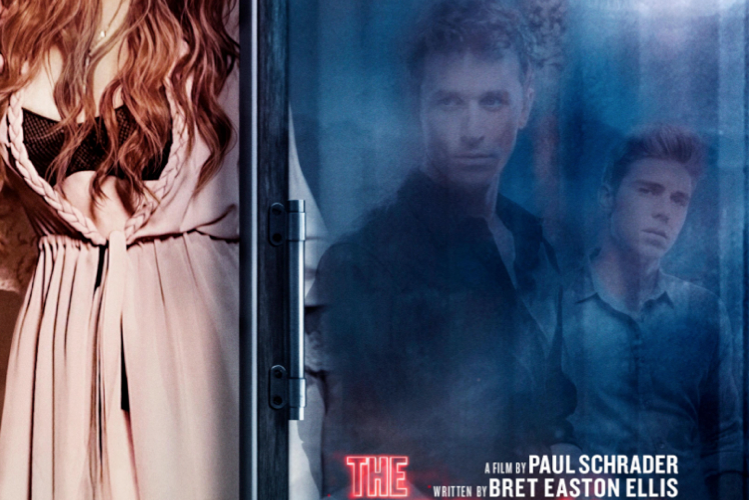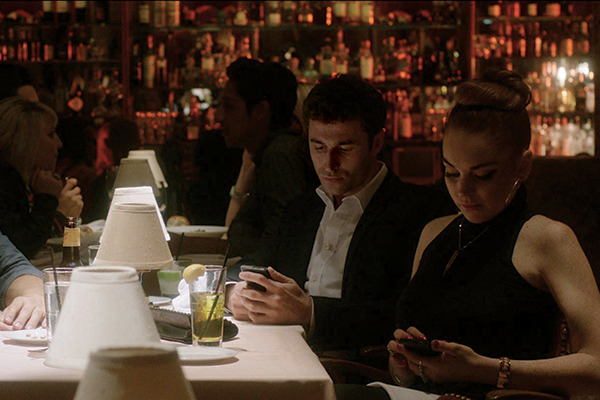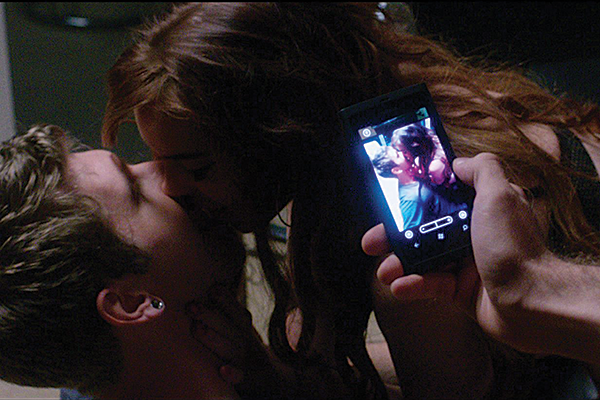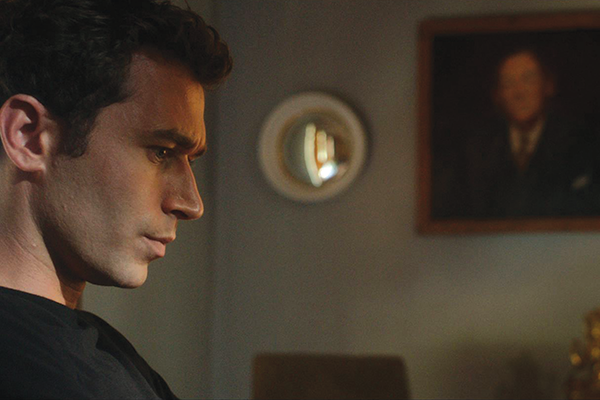Paul Schrader’s Los Angeles has changed: the fast cars, smooth clothes, and electronically edged pop music of American Gigolo may survive, but are reworked and reshaped for a modern era free of the glitz and glamor that had once made the City of Angels so ideal a home for moving pictures. As a far cry from that wallop of affable ’80s schmaltz, the city streets which open The Canyons are barren, dead, and grey, not gifted the sonic overlay of Blondie but a buzzing, Trent Reznor-esque soundscape that offers little in the way of thrills or entertainment.
The expectations instilled by such a quietly auspicious start maintain momentum with Bret Easton Ellis’ own introduction, in which two couples on different rungs of the ever-amorphous Hollywood ladder engage in a talk over some drinks. It’s an amiable union of word and image: as one side of the conversation circle around their points, intending nothing but to gently fall on a request that, in fulfillment, would better their state of being, a handsome young man is distracted by his phone, clearly not at all invested in any facet of a discussion that should be of some personal concern. Simple and clean, with the proper balance of pathos and bitterness to set a larger tone. Just when it’s off to a cruising start, however, something happens: as these young, handsome people chat, Schrader’s camera cuts to an overhead shot — not of the table they’ve been seated at, mind you, but a separate bar. Is it even in this same restaurant? Will these faceless, nameless figures have some involvement in what’s to come? Why do we hear the separately situated characters carrying on, as if nothing at all unusual is happening in the moment? What beverages are the other people ordering, anyway? None of these questions (even the lattermost) are answered; the scene returns to its original rhythm, continues, and eventually ends.
Once, minutes later, we’re introduced to the protagonists — played by porn superstar James Deen and Lindsay Lohan, whose presence sets something of a tone itself — The Canyons is rapidly evolving into a film hopelessly at odds with itself: a beautifully composed, cheap-looking “plunge” into the “tough” and “gritty” world of “Los Angeles” that has zero of the guts necessary to make any of its gestures count, nor an ounce of the brains that would give its posturing — is there ever posturing — and constant espousal of supposedly bigger ideas so much as a sliver of meaning. Yet, for all these eminently terrible qualities, there is still a congenial temperament to much of what plays out; instead of the disastrous, schadenfreude-fueled romp that a mountain of pre-release hype may have suggested, Schrader’s picture yields durable points of interest, curiosity, and discussion for both the instances in which it takes a wrong turn and, to wit, makes seemingly self-aware attempts at some manner of course-correction.
It would be fine if this was a case of push-pull between the genius of Schrader and, in so many words, the non-genius of Ellis, though it’s only to so many ends that a filmmaker’s contributions can enliven before we begin spotting cracks in the armor. 35 years after his directorial debut, the man remains a constantly patient and keen-eyed composer of images, a filmmaker who allows scenes to breathe as long as scripted events would dictate, and — excepting one or two moments à la the aforementioned crane shot — elegantly bends established formal traits to suit what a given moment requires. (Segments are of a piece with past titles: the shades of Hardcore speak for themselves, though I find more value in an explicit visual recollection of Mishima: A Life in Four Chapters — another photoshoot selling the idealized human body, from physical object to immortalized snapshot.) These images bring with them the character of Schrader through and through, but what’s corroded the feeling of it all, that very soul of his cinema, is a dinky, smeary digital palette courtesy of cinematographer John DeFazio (though cameras on which it was shot are possibly to blame). Deliberate compositions and constructions are frequently undercut, and at numerous points The Canyons‘ visual aesthetic and scripted tenor would be more suited to its male lead’s lascivious main career above all else.
A conceptually fumbled attempt at the emulation pornography would account for much of Ellis’ flat screenplay, which is filled with twice-heated conceptions about the all-surrounding ennui which we’re meant to believe buries these people’s spirits in the ground. “Nobody has a private life anymore,” Deen’s Christian remarks to Lohan’s character, Tara, in one of many lines so transparently brittle and facile that you have to at least ask if it’s been written with a wink and nod in mind. The occasional exchange has a crackle that might justify the notion, but, unfortunately, these considerations may be the furthest one could stretch within reason; I’m inclined to believe that the author-cum-screenwriter is simply lousy at building theme and consistent intention, mainly evidenced by a miserable sense of plot structure that brings direct-to-video thrillers more strongly to mind than Sunset Boulevard. Minor strands are introduced within the first twenty minutes and half-heartedly resolved an hour into the proceedings, by this point in time wholly forgotten; other instances, a major narrative turn included, are as nakedly telegraphed as its themes — or what this movie would think constitutes “themes,” as spoken out loud by its team of performers — that we can only hope Deen shows up to elevate the creep gauge while Schrader shoots away in an expert manner.
It’s the director I’ll credit for milking a pair of decent turns from said team — a lineup which, at first glance, would create in most the urge to run away instead of engage. While The Canyons‘ side players are generally wooden and ephemeral in their contributions, Deen, its lead, works the single scripted note of his character to an oddly perfect result, selling the otherwise-derivative Patrick Bateman-esque mannerisms without ever deigning to aim directly for laughs. More complexity (such as it is) has been given to Tara, a profile which bares such a quantity of obvious similarities to Lohan’s personal and public life that the effectiveness of her turn remains suspect — if not, nevertheless, all the more compelling for those shades of ambivalence. But as Schrader brings them up, Ellis brings them down: with merely one another as an onscreen companion, their drama is dull, bordering on turgid; it’s only when filtered through the scope of its more grounded supporting characters (most prominently Nolan Funk as a struggling actor) that The Canyons has a few signs of dramatic spring in its step.
But the central leads’ exertions and evidence of a director’s surviving talent have failed to find resonant culminations once a well-conceived, shoddily handled, dramatically tasteless climax is put into motion. Before you know it, we’re out the door: some plot matters are resolved, a lame twist closes out the action, and credits roll, resurrecting those images of dilapidated movie theaters styled to signify a new era of Hollywood from which there is no recovery. They didn’t need to make any effort to drive this point, though: in its final tracking shot, suspicions are already crystallized, and it’s more apparent than ever that Schrader and Ellis really don’t have a damn thing to say.
The Canyons will premiere in theaters and on VOD on Friday, August 2.




